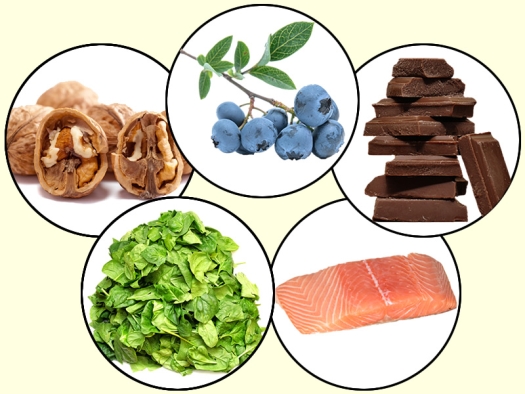WalnutsBlueberriesChocolateSpinachSalmon.jpg

Walnuts photo by 1643606; Blueberries photo by Jérémie Perron; Chocolate photo by Jörg (maja7777); Spinach photo by 3638148; Salmon photo by Piotr Eliasz (sapphir1) / Pixabay License
You don’t need a mental health diagnosis to struggle with mood – OR to get relief from functional medicine. There is a huge misconception that you need to be given an official diagnosis in order to get help with mood. That may be true for medications, but when it comes to a functional health approach?
It’s just not true.
Many people this time of year are struggling with:
- Feeling sad or hopeless
- Negative thought patterns
- Unable to get motivated
- Snapping at loved ones
- Easily irritated or angry
Or just generally feeling BLAH.
Here’s the thing:
The natural approach supports a healthy mood – whether that is your main concern or not! I’m talking about correcting underlying biochemical patterns that disrupt mood by using simple strategies like:
- Nutrition
- Exercise
- Sleep
- Stress Relief
- Supplements
Let us take a deep dive into little known causes of low mood and what we can do about it.
5 Root Causes of Low Mood
Lots of people think mood only relates to serotonin levels in the brain, but that’s only part of the story. Think of it this way:
Your brain is connected to the rest of your body. So your mood depends on the right balance of nutrients, hormones, and other chemical messengers throughout your entire body – including your gut, thyroid, and immune system.
This is not an exhaustive list, but to give you some examples, here are 5 root causes of mood issues that we investigate when taking a functional medicine approach.
- Hormonal Changes: Low thyroid hormone is a well established cause of mood problems. Estrogen, progesterone, and testosterone also influence mood. The only way to know for sure is to test.
- Chronic Inflammation: Many studies1 have linked inflammatory cytokines with mood problems – even when the source of inflammation is outside the brain. It’s thought these cytokines pass through the blood brain barrier.
- Poor Gut Health: Did you know that the microbes inhabiting your gut produce hundreds of neurochemicals – including 95% of the body’s serotonin?2 These chemicals influence both digestion AND mood, through what’s called the gut-brain axis.
- Disrupted Stress Response: Cortisol is the hormone our bodies make in response to chronic stress, and studies3 link disrupted cortisol levels with mood. We can test cortisol levels in the saliva to observe its cyclical pattern over the course of a day.
- Suboptimal Nutrition: Serotonin, dopamine, and other neurotransmitters are made out of amino acids from protein. The enzymes used to produce them depend on vitamins and minerals, like magnesium and vitamin B6. I know to some people, it may sound crazy to consider these seemingly unrelated issues when somebody struggles with mood.
But it is the case time and time again.
A whole-person approach is the most effective way to get results that last. If you or somebody you know is struggling with mood, please know that there is help.
Foods for a Better Mood
Feeling grumpy, sluggish, or just plain blah?
Foods can have a powerful effect on your mood (both good and bad), so let’s start there.
Some people grab foods they *think* make them feel good (ice cream anyone?) but end up feeling worse once the sugar rush wears off.
How about next time, think about reaching for one of these science-backed foods to improve your mood:
- Blueberries: One study4 found wild blueberry juice improved mood in children and young adults within one hour of drinking it!
- Walnuts: Walnuts not only contain omega-3s but also a natural source of serotonin! One study5 found that half a cup of walnuts per day improved mood in college-aged men.
- Green Leafy Veggies: Swiss chard, spinach, and kale are packed with phytonutrients that combat inflammation – a known contributor to low mood.
- Fatty Fish: Fish like salmon, anchovies, sardines, herring, and cod contain omega-3 fatty acids that fight inflammation and support a healthy mood.
- Dark Chocolate: There’s a “bliss molecule” in the brain called anandamide. Guess what? It’s also in dark chocolate. Dark chocolate also has magnesium, which is needed to produce serotonin.
I’m not suggesting food is a quick fix, but if you get in the habit of grabbing healthy mood food, you’re sure to notice the effects over time. And If you’re looking for a complete dietary plan? Check out the Mediterranean Diet. It has the most research and evidence to show it supports mood.
Supplements for Natural Mood Support
So many people deal with feeling crabby, irritated, sad, or blue... thinking there is nothing they can do except go to their doctor for a prescription. Sure, there may be some people who could benefit from a prescription, but I bet that MORE could benefit from eating healthier foods, exercising, and taking targeted nutritional supplements.
Here are some supplements I use for mood support:
- St. John’s Wort: St. John’s Wort is an herb that can be taken as a liquid or capsule and has been shown to support mood. It does interact with some medications and supplements, so check with your doctor to be sure it is safe for you.
- Tryptophan or 5-HTP: Tryptophan is a naturally occurring amino acid in foods but can be boosted with supplementation. Tryptophan crosses into the brain, where it is converted into 5-HTP and then into serotonin. It can also interact with medications.
- B Vitamins: B vitamins are needed for many enzymes in the body and brain to work – including enzymes that produce serotonin and other neurotransmitters! Your body needs a balance of B vitamins, which you can get in a B Complex or multivitamin.
- Omega-3s: Omega-3s are essential fatty acids that are concentrated in fatty fish, nuts, and seeds. They support healthy inflammatory pathways and have been shown in studies to support mood!
Please note this post is purely educational (not medical advice), and I encourage you to see a health practitioner if you struggle with mood.
Revised by Joanne Quinn, Ph.D.; content provided by Wellnesswriter.com.


